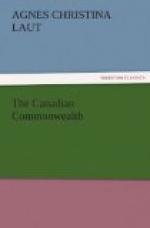The line is a fine one and needs to be drawn with distinction. Canada does not begrudge the down-and-outs, the failures, the disinherited, the dispossessed, a chance to begin over again. She realizes that she has room, boundless room, for such as they are to succeed—and many more; but what she can not and will not do is assume the burden of these people when they come to Canada and will not try and fail. What she can not and will not do is permit Europe to clean her pig-sties of vice and send the human offal to Canadian shores. Children, strays, waifs, reforms—who have been taken and tested and tried and taught to support themselves—she welcomes by the thousands. In fact, she has welcomed 12,260 of them in ten years, and the cases of lapses back to failure have been so small a proportion as to be inconsiderable.
In the early days, “the remittance man”—or young Englishman living round saloons in idleness on a small monthly allowance from home—fell into bad repute in Canada; and it didn’t help his repute in the least to have a title appended to his remittance. Unless he were efficient, the title stood in his way when he applied for a job, whether as horse jockey or bank clerk. Canadians do not ask—“Who are you?” or “What have you?” but “What can you do?” “What can you do to add to the nation’s yearly output of things done—of a solid plus on the right side of the yearly balance?” It is a brutal way of putting things. It does not make for poetry and art. It may be sordid. I believe as a people we Canadians, perhaps, do err on the sordid side of the practical, but it also makes for solidity and national strength.
Ten years have witnessed a complete change in the class of Englishmen coming to Canada. The drifter, the floater, the make-shift, rarely comes. The men now coming are the land-seekers—of the blood and type that settled England and New England and Virginia—of the blood and type, in a word, that make nations. Hard on the heels of the land-seekers have come yet another type—the type that binds country to country in bonds tighter than any international treaty—the investors of surplus capital.
III
It is possible to keep a record of American investments in Canada; because possessions are registered more or less approximately at ports of entry and in bills of incorporation; but the English investor has acted through agents, through trust and loan companies, through banks. He is the buyer of Canada’s railway stocks, of her municipal, street railway, irrigation and public works bonds. Of Canadian railroad bonds and stocks, there are $395,000,000 definitely known to be held in England. Municipal and civic bonds must represent many times that total, and the private investments in land have been simply incalculable. The Lloyd George system of taxation was at once followed by enormous investments by the English aristocracy




